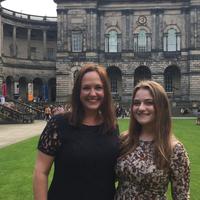 At the Scottish Universities' International Summer School, playwright Sarah Grammar '18 learns a distinct line of inquiry from one of the UK's most honored playwrights.
At the Scottish Universities' International Summer School, playwright Sarah Grammar '18 learns a distinct line of inquiry from one of the UK's most honored playwrights.
by Sarah Grammar '18
2016 Artist Development Fellow
Sarah Grammar ’18, a resident of Currier House concentrating in Theater, Dance & Media, was awarded a Fellowship to attend the Scottish Universities’ International Summer School (SUISS) Creative Writing and Theater & Performance programs, as well as engage in research on British female playwrights. Grammar, who has studied advanced playwriting with Briggs-Copeland Lecturer on English Sam Marks, has stage-managed, light-designed, and acted in a number of Harvard-Radcliffe Dramatic Club (HRDC) productions. Grammar’s lighting design work was seen in the April production of Annie Baker‘s The Flick at Adams Pool Theater. She plans to pursue a career in playwriting and arts education. This is the first of two blog posts about Grammar's summer in Scotland; read the second here.
 Stef Smith is a playwright from the UK with an Olivier Award under her belt and plenty of other accolades to boot. If she retired tomorrow, she’d be leaving behind a body of work that some people three times her age never get close to creating. She wrote and premiered RoadKill, for which she won the Olivier, before turning thirty.
Stef Smith is a playwright from the UK with an Olivier Award under her belt and plenty of other accolades to boot. If she retired tomorrow, she’d be leaving behind a body of work that some people three times her age never get close to creating. She wrote and premiered RoadKill, for which she won the Olivier, before turning thirty.
She’s energetic. In a two-hour class at SUISS that never felt longer than about 20 minutes, she somehow managed to get us asking questions of all different scales, from the mundane, “Why don’t hot dogs and hot dog buns come in packs of equal quantity?”, to the extremely existential, “What does it mean to be alive? To live? Are they different questions?" She had us transform our questions into physical entities, prompting us to answer questions like “What color is the question? What shape? If it were a crowd of people, how many people would be in that crowd? What color are its fingernails? What size shoe does the question wear? What race is it? Does it have a gender?”, and create the beginning of a play with this oddly-characterized, pink fingernail-ed, size-12 shoe-wearing, 1000-person, un-gendered question. According to Smith, her plays begin from questions similar to these that makes her writing an exploration that uncovers the various pieces and parts of the question and its implications (though she notes that she doesn't feel the need to answer that question in the process). Inspiration for Swallow, one of Smith’s plays, came from the meaty question “How does female anger manifest itself?” This jumping-off point, says Smith, doesn't have to be explicitly revealed to the audience for the piece to have the impact it does.
According to Smith, her plays begin from questions similar to these that makes her writing an exploration that uncovers the various pieces and parts of the question and its implications (though she notes that she doesn't feel the need to answer that question in the process). Inspiration for Swallow, one of Smith’s plays, came from the meaty question “How does female anger manifest itself?” This jumping-off point, says Smith, doesn't have to be explicitly revealed to the audience for the piece to have the impact it does.
Part of my work here in Scotland has been researching writers like Stef Smith, Caryl Churchill, Sarah Kane and Liz Lochhead. In terms of content and genre, they could not be more diverse, touching on subjects that range from war-torn hotel rooms in Leeds to satirical retellings of Dracula to site-specific dramas about human trafficking. What unifies these writers is their unique place as women in a predominantly male art form in the United Kingdom, a culture known for its rich (and historically male) theatrical tradition. And, while Sarah Kane might not agree with the term "female writer" as I've discovered during the course of my studies, the unique voice these playwrights contribute to theater in the UK is undeniable.
If the goal here is to gain inspiration from these writers, a fleeting two-hour workshop with Stef Smith did the trick.
The Artist Development Fellowship program, jointly administered by the Office for the Arts at Harvard, the Office of Undergraduate Research and Fellowships and Office of Career Services, awards 10-15 fellowships annually to promising and/or accomplished student artists and creators who have an unusual opportunity for artistic growth and transformation. The program is open to all undergraduates currently enrolled in Harvard College, and applications are evaluated by the Council on the Arts, a standing committee of the Faculty of Arts and Sciences. For more information, visit the OFA website or call 617.495.8676.